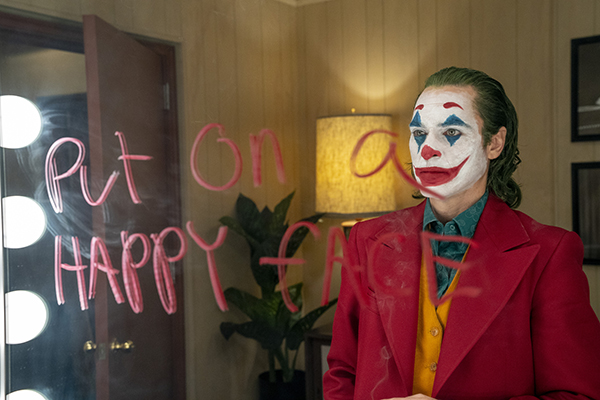The highly anticipated and extremely controversial “Joker,” directed by Todd Phillips (“The Hangover”), has arrived, detailing a complex, mesmerizing and terrifying story about the infamous villain’s preliminary path of destruction.
“Joker” pulls down the comic book veil and presents an unfiltered and utterly disturbing tale of an unstable human being. Arthur Fleck is a struggling clown trying to find work in the deteriorating Gotham City. In between attempts to pursue a career in comedy, Fleck spends time caring for his elderly mother, played by Frances Conroy. Arthur’s life becomes plagued with prejudice and misfortune, leading him down a path of terrifying violence
resulting in Batman’s iconic foe.
Joaquin Phoenix plays Arthur Fleck, who later becomes the Joker, by putting on a performance reflecting the
deterioration and malice he harbors
within him. Phoenix manipulates his facial expressions to smile in all sorts of horrifying ways, suggesting that he is consistently on the brink of acting out. There’s a stylistic, twisted flamboyance that oozes from his performance consuming everything from his body language to line delivery.
Fleck is far from a sympathetic character — he is the embodiment of societal evil. Viewers are not meant to feel happy about his achievements. In fact, audiences will constantly dread his next step to power. The score reflects these feelings by never truly conveying a somber or joyous feeling as they are all accompanied by a dark, heavy instrumental undertone.
A lot of controversy and concern surrounded the film before its release, and unfortunately much of it is somewhat justified. This is an ugly film, one that forces viewers to spend over an hour following a deranged character. Similar to being stuck on a terrifying haunted house ride at an amusement park, audiences have no choice but to witness the horror.
The violence is unfiltered, visceral and uncomfortably reminiscent of modern-day America. However, these moments are not glorified. They are depicted terrifyingly, as they should be. The violence in this film is anything but heroic, and its graphic nature drives this point home. There are no misogynistic plot elements or character traits within the film, as many were worried about.
There’s a certain meta-awareness within “Joker.” One instance involves characters talking about the subjectivity of entertainment, which gives a nod toward the endless discussion that has been revolving around the film. Phillips appears to know that his film will raise eyebrows, and makes an attempt to attack these discussions through the eyes of
his characters.
Despite the intense thematic imagery, “Joker” is a technical masterclass in filmmaking. Sleek cinematography, scoring, performances and editing piece together this story with grace. It stays true to its tone, conveying an ominous and decaying vibe throughout. “Joker” ascends past its comic book limitations and reaches for an explicit and topical character study.
“Joker” plays a weird balancing act between its comic book inspirations and gritty interpretation of reality. On one hand it plays into the Bruce Wayne, Joker rivalry that has notoriously consumed thousands of Batman comic books, while on the other it tells the story of a fragile and menacing individual suffering from a mental illness. It’s difficult to process the violent imagery in the film as one can’t just displace it as a fictional comic book story.
“Joker” is an extremely memorable film — albeit not the first of its kind — for all the right and wrong reasons. It’s visceral, bleak, dark, disturbing and everything in between. In a way, it’s a menacing masterpiece. In another, it’s an extremely uncomfortable exploration of mental illness. This film is certainly not needed during this time in America, but it’s here and there’s nothing moviegoers can do about it.
I can’t give this a rating. It’s horrifying.





















